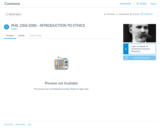
This is a course I am creating based on ethical theories within the context of Worldviews.
- Subject:
- Language, Philosophy, and Culture
- Philosophy
- Material Type:
- Full Course
- Author:
- Jack O'Connor
- Date Added:
- 09/14/2023

This is a course I am creating based on ethical theories within the context of Worldviews.
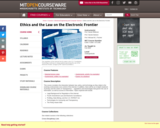
This course considers the interaction between law, policy, and technology as they relate to the evolving controversies over control of the Internet. In addition, there will be an in-depth treatment of privacy and the notion of "transparency" -- regulations and technologies that govern the use of information, as well as access to information. Topics explored will include: Legal Background for Regulation of the Internet Fourth Amendment Law and Electronic Surveillance Profiling, Data Mining, and the U.S. PATRIOT Act Technologies for Anonymity and Transparency, The Policy-Aware Web
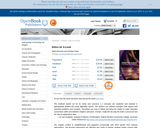
What does pleasure have to do with morality? What role, if any, should intuition have in the formation of moral theory? If something is ‘simulated', can it be immoral?
This accessible and wide-ranging textbook explores these questions and many more. Key ideas in the fields of normative ethics, metaethics and applied ethics are explained rigorously and systematically, with a vivid writing style that enlivens the topics with energy and wit. Individual theories are discussed in detail in the first part of the book, before these positions are applied to a wide range of contemporary situations including business ethics, sexual ethics, and the acceptability of eating animals. A wealth of real-life examples, set out with depth and care, illuminate the complexities of different ethical approaches while conveying their modern-day relevance.
This concise and highly engaging resource is tailored to the Ethics components of AQA Philosophy and OCR Religious Studies, with a clear and practical layout that includes end-of-chapter summaries, key terms, and common mistakes to avoid. It should also be of practical use for those teaching Philosophy as part of the International Baccalaureate.
Ethics for A-Level is of particular value to students and teachers, but Fisher and Dimmock's precise and scholarly approach will appeal to anyone seeking a rigorous and lively introduction to the challenging subject of ethics.
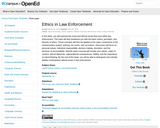
In this book, you will examine the moral and ethical issues that exist within law enforcement. This book will also familiarize you with the basic history, principles, and theories of ethics. These concepts will then be applied to the major components of the criminal justice system: policing, the courts, and corrections. Discussion will focus on personal values, individual responsibility, decision making, discretion, and the structure of accountability. Specific topics covered will include core values, codes of conduct, ethical dilemmas, organizational consequences, liability, and the importance of critical thinking. By the end of this book, you will be able to distinguish and critically debate contemporary ethical issues in law enforcement.
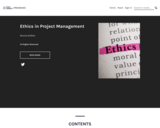
This module is an introduction to the ethical considerations of project management.
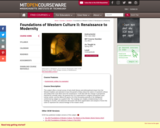
This subject offers a broad survey of texts (both literary and philosophical) drawn from the Western tradition and selected to trace the growth of ideas about the nature of mankind's ethical and political life in the West since the renaissance It will deal with the change in perspective imposed by scientific ideas, the general loss of a supernatural or religious perspective upon human events, and the effects for good or ill of the increasing authority of an intelligence uninformed by religion as a guide to life. The readings are roughly complementary to the readings in 21L001, and classroom discussion will stress appreciation and analysis of texts that came to represent the cultural heritage of the modern world.
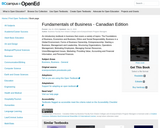
An introductory textbook in business that covers a variety of topics: The Foundations of Business, Economics and Business, Ethics and Social Responsibility, Business in a Global Environment, Forms of Business Ownership, Entrepreneurship: Starting a Business, Management and Leadership, Structuring Organizations, Operations Management, Motivating Employees, Managing Human Resources, Union/Management Issues, Marketing: Providing Value, Accounting and Financial Information, and Personal Finances.

This two-part resource is designed to support instructors and students as they navigate the presence of generative AI tools, specifically Large Language Models (LLMs) such as ChatGPT, in the rhetoric and composition classroom. Part I of this resource offers an instructor-focused introduction to what LLMs are and how they operate, as well as an in-depth exploration of the privacy concerns and ethical considerations related to using a tool like ChatGPT. Additionally, Part I provides insights on the practical application of LLMs within the realm of reading and writing in the rhetoric and composition classroom, while promoting a modified stasis theory as a strategy for evaluating any generated output.
Part II of this resource offers student-focused tutorials that demonstrate how ChatGPT can augment the writing process for assignments commonly given in a rhetoric and composition course. These tutorials cover the evaluation essay, rhetorical analysis, Rogerian argument, annotated bibliography, and research essay—all while promoting the responsible and ethical use of AI in writing and research. With this comprehensive resource, instructors and students can not only build confidence in their understanding of generative AI within academia, but also build digital literacy that will serve them in the world beyond.

This textbook provides an innovative, internationally oriented approach to the teaching of corporate social responsibility (CSR) and business ethics. Drawing on case studies involving companies and countries around the world, the textbook explores the social, ethical, and business dynamics underlying CSR in such areas as global warming, genetically modified organisms (GMO) in food production, free trade and fair trade, anti-sweatshop and living-wage movements, organic foods and textiles, ethical marketing practices and codes, corporate speech and lobbying, and social enterprise. The book is designed to encourage students and instructors to challenge their own assumptions and prejudices by stimulating a class debate based on each case study.
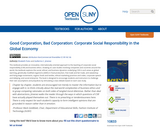
This textbook provides an innovative, internationally oriented approach to the teaching of corporate social responsibility (CSR) and business ethics. Drawing on case studies involving companies and countries around the world, the textbook explores the social, ethical, and business dynamics underlying CSR in such areas as global warming, genetically modified organisms (GMO) in food production, free trade and fair trade, anti-sweatshop and living-wage movements, organic foods and textiles, ethical marketing practices and codes, corporate speech and lobbying, and social enterprise. The book is designed to encourage students and instructors to challenge their own assumptions and prejudices by stimulating a class debate based on each case study.
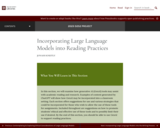
In this section, we will examine how generative AI (GenAI) tools may assist with academic reading and research. Examples of content generated by ChatGPT will show how GenAI may be incorporated into a classroom setting. Each section offers suggestions for use and various strategies that could be incorporated for those who wish to allow the use of these tools for assignments. Included throughout are suggestions on how to promote students’ ethical and effective use of these tools and to possibly limit their use if desired. By the end of this section, you should be able to use GenAI to support reading practices.
Author: Jonahs Kneitly
Contributors: Gwendolyn Inocencio, Mary Landry, C. Anneke Snyder
Designers: Irene AI, Sweta Kailani
Supervisors: Terri Pantuso, Sarah LeMire
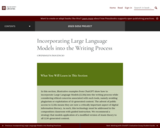
In this section, illustrative examples from ChatGPT show how to incorporate Large Language Models (LLMs) into the writing process while considering ethical concerns associated with such tools, namely avoiding plagiarism or exploitation of AI-generated content. The advent of public access to LLMs means they are now a critically important aspect of digital information literacy. As such, this technology must be addressed in the composition classroom with guided instruction. We recommend a strategy that models application of a modified version of stasis theory to all LLM-generated content.
After reading this section you should be prepared to teach stasis theory as a strategy for continual interrogation that helps rhetors discern whether generative-AI content exhibits appropriate depth, scope, and quality, along with the appropriate next steps in argumentation, writing, or research.
Author: Gwendolyn Inocencio
Contributors: C. Anneke Snyder, Mary Landry, Jonahs Kneitly
Designers: Irene AI, Shweta Kailani
Supervisors: Terri Pantuso, Sarah LeMire
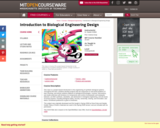
" This class is a project-based introduction to the engineering of synthetic biological systems. Throughout the term, students develop projects that are responsive to real-world problems of their choosing, and whose solutions depend on biological technologies. Lectures, discussions, and studio exercises will introduce (1) components and control of prokaryotic and eukaryotic behavior, (2) DNA synthesis, standards, and abstraction in biological engineering, and (3) issues of human practice, including biological safety; security; ownership, sharing, and innovation; and ethics. Enrollment preference is given to freshmen. This subject was originally developed and first taught in Spring 2008 by Drew Endy and Natalie Kuldell. Many of Drew's materials are used in this Spring 2009 version, and are included with his permission. This OCW Web site is based on the OpenWetWare class Wiki, found at OpenWetWare: 20.020 (S09)"
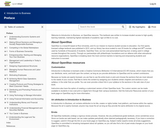
Introduction to Business covers the scope and sequence of most introductory business courses. The book provides detailed explanations in the context of core themes such as customer satisfaction, ethics, entrepreneurship, global business, and managing change. Introduction to Business includes hundreds of current business examples from a range of industries and geographic locations, which feature a variety of individuals. The outcome is a balanced approach to the theory and application of business concepts, with attention to the knowledge and skills necessary for student success in this course and beyond.
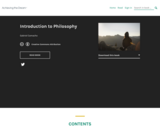
This textbook is an introduction to Philosophy. It covers the nature of philosophy, logic, ethics, metaphysics and epistemology, and the philosophy of religion.

The goal of this text is to present philosophy to newcomers as a living discipline with historical roots. While a few early chapters are historically organized, my goal in the historical chapters is to trace a developmental progression of thought that introduces basic philosophical methods and frames issues that remain relevant today. Later chapters are topically organized. These include philosophy of science and philosophy of mind, areas where philosophy has shown dramatic recent progress. This text concludes with four chapters on ethics, broadly construed. I cover traditional theories of right action in the third of these. Students are first invited first to think about what is good for themselves and their relationships in a chapter of love and happiness. Next a few meta-ethical issues are considered; namely, whether they are moral truths and if so what makes them so. The end of the ethics sequence addresses social justice, what it is for one’s community to be good. Our sphere of concern expands progressively through these chapters. Our inquiry recapitulates the course of development into moral maturity
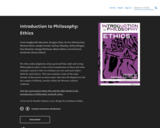
We often make judgments about good and bad, right and wrong. Philosophical ethics is the critical examination of these and other concepts central to how we evaluate our own and each others' behavior and choices. This text examines some of the main threads of discussion on these topics that have developed over the last couple of millenia, mostly within the Western cultural tradition.
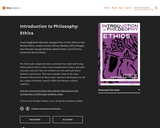
We often make judgments about good and bad, right and wrong. Philosophical ethics is the critical examination of these and other concepts central to how we evaluate our own and each others’ behavior and choices.
This text examines some of the main threads of discussion on these topics that have developed over the last couple of millenia, mostly within the Western cultural tradition. It considers basic questions about moral and ethical judgment: Is there such a thing as something that is really right or really wrong independent of time, place and perspective? What is the relationship between religion and ethics? How can we reconcile self-interest and ethics? Is it ever acceptable to harm one person in order to help others? What do recent discussions in evolutionary biology or have to say about human moral systems? What is the relation between gender and ethics? The authors invite you to participate in their exploration of these and many other questions in philosophical ethics.
If you are adopting or adapting this book for a course, please let us know on our adoption form for the Introduction to Philosophy open textbook series: https://docs.google.com/forms/d/e/1FAIpQLSdwf2E7bRGvWefjhNZ07kgpgnNFxVxxp-iidPE5gfDBQNGBGg/viewform?usp=sf_link.

This is an introductory course to Philosophy, which is the study of general and fundamental problems such as those connected with existence, knowledge, values, reason, mind, and language. Students will be introduced to the primary branches of Philosophy - ethics, logic, metaphysics, and epistemology. The course considers philosophers and works of Western Philosophy, including Plato, Hebrew scripture, Schopenhauer, Swedenborg, Buber, Kant, Hume, Locke and Berkeley.
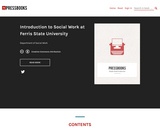
This book was written by MSW students as their final project for their Capstone class. Students were each assigned a chapter of the book to write to show that they had achieved competency as a Master’s level social worker. Chapters were assigned based on student interest and experience in certain areas of the field.